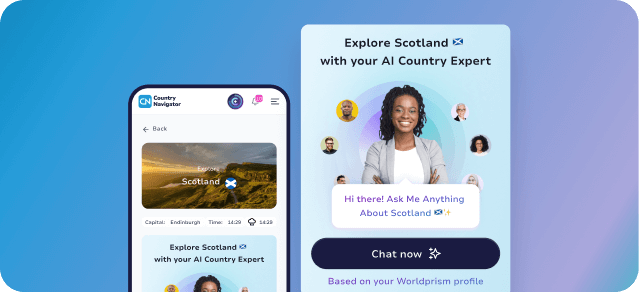Set your new hires up for success
.jpg)
This is a hugely exciting development but raises several questions that touch on the core principles we promote at Country Navigator.
The challenges of inclusion
Firstly, there is the question of inclusion. Access to the metaverse requires a more expensive computer with VR headsets and quality cameras. By raising the entry price through increased technical requirements, we deepen the gap between the haves and have-nots. Those who cannot afford it, will either be excluded entirely or will have an inferior experience.
In Satya Nadella’s video, he invites Accenture to talk about their onboarding processes, which they want to do in the metaverse. This will take a large upfront investment to make it a seamless, engaging experience. Accenture, however, will need to be careful that they don’t neglect the experience for ‘real-life’ onboarders nor differentiate between pay grades as to who gets to have the ‘full-fat’ onboarding.
A window into our personal lives
One of the big questions of 2020 was camera on or camera off? Hybrid working has brought your colleagues into your intimate spaces at home – some right into the bedroom. Our personal lives have been brought to work in an unprecedented way. Cameras make it much easier to build relationship and have a ‘near-normal’ conversation with someone, but they reveal living conditions and family status, they can expose lifestyle to scrutiny and judgement and in some cases increase the risk to some vulnerable people.
The metaverse is likely to increase these concerns – after all the main principle is to blur the line between digital and real life. Organizations will have to work extremely sensitively to ensure that all are included and that the metaverse does not destroy the work/life balance that has become central to the wellbeing of their employees.
Ethical questions
The second challenge facing inhabitants of the metaverse is that of culture. The great grandparent of the metaverse is Second Life. Second life launched in 2003 as a game or leisure activity that allowed users to create an avatar and experience a different life, freed from expectations, inhibitions and the restrictions of societal norms. It allowed thousands of users the opportunity to re-imagine themselves.
It also raised the question of online morality and ethics. What are the unwritten rules of virtual interaction? Are relationships created in Second Life sustainable in real life? What does authenticity look like if you can create an avatar that looks nothing like the ‘real’ you and an identity that doesn’t behave like the ‘real’ you?
In cultural terms, it seems likely that people will have two cultural profiles – a ‘real’ one and a ‘virtual’ one.
Freedom or security?
And that’s a problem for business (not to mention wider society). Freed from the restrictions of real-life, our digital personalities are more extreme. We lose some of the beneficial checks and balances that society gives us to help us interact effectively with other people.
It would be a safe bet to assume that most people reading this have sent an email expressing an emotion or feeling (usually anger) that they would have considered saying face to face. Digitally mediated communication gives us an illusion of impunity.
This means that even organizations that like to be seen as hands-off and relaxed will have to impose strict guidelines on digital interactions. Consider the ethical considerations. If you know that your potential client is black, would it be appropriate for you to create a black avatar to create a (false?) sense of commonality? Is it acceptable to make your avatar more (subjectively) attractive in order to give you more confidence in interacting with others? To cheer yourself up, imagine the poor HR advisor tasked with writing an Additional Attractiveness policy!
Redefining culture
As interculturalists we have been used to describing culture as the things that a group consider normal; culture evolves from the behaviors, attitudes and values that group develops from the experiences of the individuals. Culture allows us to function effectively as groups without having to redefine what is and what is not acceptable in any given situation. The metaverse has the potential to remove that definition and the security it gives. It allows – and, in fact, encourages – participants to rethink culture.
The metaverse could be the answer to culture. In rethinking culture, can we create a space where we have the revealed implicit hidden assumptions that we make all the time? Can it overcome the problems of unconscious bias and give voice to underrepresented groups? Is culture something that can be pre-programed into the software?
Prof. Hofstede wrote that culture is ‘the software of the mind.’ It is completely possible that in the metaverse, the mind could become the software of culture – in other words, we will intentionally create the culture that enables our business objectives, empowers employees to function at a higher level and collaborate seamlessly.
We will have the opportunity to encourage individuality and self-expression without risking the communality and cooperation needed for businesses to function effectively. The metaverse raises the importance of self-awareness and self-management. We will have fewer communication cues to help us interpret others’ communication and behavior, so we must discipline ourselves to adapt ourselves to the established group norms to avoid miscommunication.
The risk of damaging inclusion is a significant one, however the metaverse offers huge potential to build community and to rethink culture and identity. It is unclear how much of what is promised is marketing subjectivity and how much is achievable reality, but as interculturalists, heavily involved in the digital world, we are hugely excited by the potential.
We’ve got over three decades of experience supporting over 1 million people worldwide. We’re passionate about delivering change; how can we help you?
- AI,
- Blog,
- Complex Organizations,
- Cultural Intelligence,
- Cultural Intelligence (featured),
- Diversity & Inclusion,
- Global Leadership & Transformation,
- Global Leadership Development,
- Global Mobility,
- Global Team Collaboration,
- Hybrid Working,
- Influence,
- Performance and Feedback,
- Product News,
- Talent Acquisition & Onboarding,
- Team & Collaboration,

Matthew Maclachlan
Matthew MacLachlan is a seasoned expert in cultural intelligence and inclusion, currently serving as the Head of Learning Innovation at Country Navigator. With over two decades of experience, he designs innovative learning solutions to foster culturally intelligent and inclusive organizations. Matthew's career spans roles such as Learning and Development Manager at the University of Surrey, Head of Intercultural and Communication Skills at Learnlight, and Intercultural Account Manager at Farnham Castle. An advocate for practical, research-backed learning, he co-hosts the "Hippo Question Podcast" on cultural intelligence and inclusion. More posts by Matthew MaclachlanRelated articles
Ready to get started?
Kickstart your cultural intelligence journey and try our
no-obligation free trial for 14 days
Join companies already using Country Navigator




COMMENTS